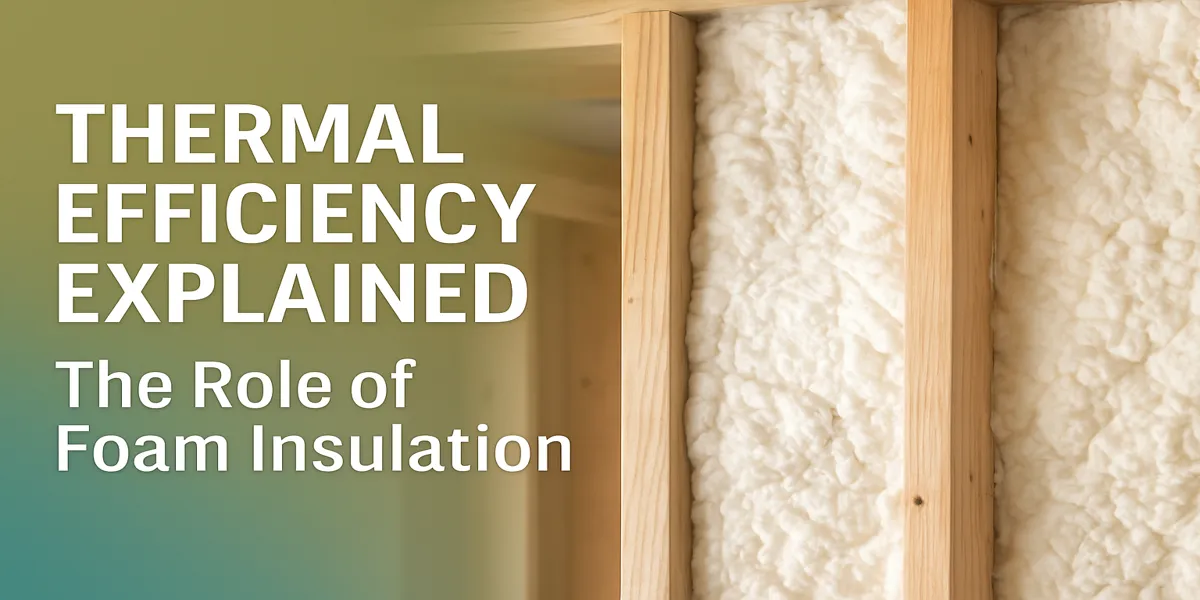When you think about keeping your home comfortable, the first things that come to mind are probably heating and air conditioning. But behind the scenes, there's a quiet hero that decides whether your HVAC system works hard or works smart: thermal efficiency. The better your home holds onto conditioned air and resists outside temperatures, the less energy you use and the more comfortable you feel. Foam insulation plays a major role in this process, often outperforming traditional materials in ways homeowners may not even realize.
What Do We Mean by Thermal Efficiency?
At its core, thermal efficiency describes how well a material or system resists heat transfer. Every home is constantly engaged in a tug-of-war with the outdoors — hot summer air pushing in, winter cold trying to sneak through, and your expensive conditioned air trying to slip away. A thermally efficient home slows this transfer down.
Building materials like walls, windows, and insulation all play a part in this balance. The less heat flow that occurs through them, the less energy your HVAC system needs to maintain a steady indoor climate. In short: greater thermal efficiency equals less wasted energy and more comfort.
Why Foam Insulation Makes a Difference
Most homeowners are familiar with fiberglass batts or cellulose insulation. These materials work, but they don't always address the small leaks and gaps that are responsible for a surprising amount of energy loss. Spray foam changes that equation because it does two jobs at once: it resists heat transfer and it seals air leaks.
When foam expands, it fills cracks, gaps, and crevices in ways that other materials cannot. This creates a continuous barrier around your home, blocking the pathways through which air and heat typically escape. The result isn't just better insulation — it's a stronger building envelope.
Comfort Beyond Numbers
Talking about R-values and U-factors is important, but what homeowners really notice is how the house feels day to day. Rooms with foam insulation tend to maintain more even temperatures, with fewer cold spots in winter or hot, stuffy areas in summer. That consistent comfort is part of what makes foam insulation such a valuable upgrade.
It also contributes to quieter interiors. The same barrier that keeps out unwanted heat and cold also reduces the transmission of outside noise. For families living near busy roads or in dense neighborhoods, this can make a noticeable difference in quality of life.
Long-Term Energy Savings in Northern Virginia
Think of thermal efficiency as an investment. While spray foam insulation may cost more upfront than traditional materials, its ability to improve efficiency can pay off month after month in reduced utility bills. Over the years, the savings can add up significantly, often offsetting the initial cost.
Another benefit is how foam reduces the strain on heating and cooling equipment. When your system isn't fighting constant air leaks, it cycles on and off less frequently. That not only saves energy but can extend the lifespan of your HVAC equipment, delaying costly replacements.
Moisture and Indoor Air Quality Benefits
Thermal efficiency is about more than just temperature control. Foam insulation helps manage moisture, which is closely tied to both comfort and health. By sealing out humid air, it reduces the chance of condensation inside walls and crawl spaces. That means less opportunity for mold growth and fewer allergens circulating in the air you breathe.
Better air quality goes hand in hand with better energy efficiency. A tightly sealed, well-insulated home keeps pollutants, dust, and outdoor irritants from sneaking in through cracks and seams. Families with asthma or allergies often feel the difference quickly after upgrading.
The Northern Virginia Climate Challenge
Homes in Northern Virginia face unique challenges. Summers bring heavy humidity and high temperatures, while winters deliver icy winds and freezing nights. A house without strong insulation feels every swing of the seasons, leading to uncomfortable drafts and rising bills.
Foam insulation helps stabilize these extremes. In summer, it keeps hot, damp air out of attics and crawl spaces. In winter, it seals drafts and cold air infiltration. The result is a home that feels more consistent and predictable year-round, no matter how the weather outside changes.
How DMV Foam Can Help
At DMV Foam, we've helped countless Northern Virginia homeowners improve their thermal efficiency with modern spray foam insulation solutions. We understand that every home is unique, which is why we start with a detailed evaluation of your current insulation and energy performance.
Our team specializes in identifying where heat loss occurs and recommending the most effective solutions for your specific situation. Whether it's sealing attic air leaks, insulating crawl spaces, or upgrading wall insulation, we make sure your investment delivers maximum comfort and energy savings.
Making the Right Choice for Your Home
Understanding thermal efficiency can feel technical, but the outcome is simple: less energy wasted, more comfort gained. Foam insulation is one of the most effective ways to achieve this because it improves both resistance to heat flow and airtightness.
If you're considering upgrades, talk to a professional about which areas of your home would benefit most. Often, attics and crawl spaces are the best places to start, but every home is unique. With the right approach, you can transform your house into a truly thermally efficient space.
Thermal efficiency is the invisible factor that shapes how comfortable and affordable your home is to live in. When you invest in foam insulation, you're not just buying energy savings — you're creating a home that feels better, lasts longer, and performs at its best through every season.
Ready to Improve Your Home's Thermal Efficiency?
Get a free home evaluation and discover how spray foam insulation can transform your home's comfort and efficiency.
Schedule Your Free Evaluation